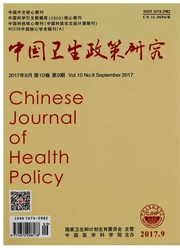

 中文摘要:
中文摘要:
目的:对新医改背景下乡村医生的发展及其作用机制进行分析。方法:运用扎根理论的研究方法,在对30名乡村医生进行半结构式访谈的基础上,经过开放式编码、主轴编码和选择编码对乡村医生工作的发展及形成机制进行系统研究。结果:经过三级编码,最终梳理出与乡村医生发展相关的108个概念、18个范畴、7个主范畴和3个核心范畴,形成新形势下乡村医生的发展作用理论模型,主要包括医改部分政策挤压、乡村环境需求变迁以及乡村医生素质能力三条脉络。结论:在多重政策的挤压下,乡村医生的待遇降低、工作积极性下降,加之乡村医生群体自身的质量不高、服务水平不足,难以满足乡村环境变迁对乡村医生在职业素养、角色、服务水平等方面的需求提升,导致乡村医生流失严重,数量减少,发展陷入困境。因此,需对新医改背景下的基本药物制度、公共卫生制度以及相关配套政策进行改革完善,同时通过乡村医生的引进、培养等机制提高其服务能力,促使乡村医生向全科医生转型。
 英文摘要:
英文摘要:
Objective: To analyze the development mechanism of rural doctors in the background of the new healthcare reform. Methods: On the basis of semi-structured interviews with 30 rural doctors,the grounded theory was used to analyze the development and formation mechanism of rural doctors through open coding,axial coding and selective coding. Results: After three level coding,108 concepts,18 categories,7 main categories and 3 core categories that related to the development of rural doctors were eventually come out. There was formation and development of the role theoretical models under the new situation of rural doctor,which included medical reform policy extrusion,changing rural environment needs,and quality and ability context of rural doctors. Conclusion: In the extrusion of multiple medical reform policies,rural doctors treatment decreased,work enthusiasm declined,coupled with rural doctors group itself is not of high quality,and service levels are inadequate. This is a situation which cannot meet the needs of rural environment changes for rural doctors in professional quality,character,service level,etc.,resulting in serious loss of doctors in rural areas,and reducing the number results into a development trouble. Therefore,the basic medicine system,public health system and relevant supporting policies need to be improved and reformed,and introduction of rural doctors,training and other mechanisms are required to enhance the service ability and promote rural doctors transition to general practitioners.
 同期刊论文项目
同期刊论文项目
 同项目期刊论文
同项目期刊论文
 期刊信息
期刊信息
